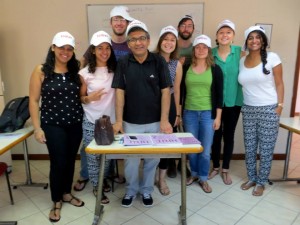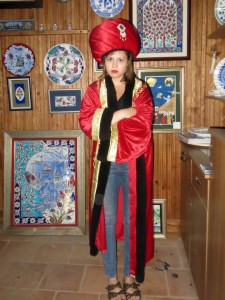Hello from Turkey! I am now at the halfway point of my State Department Critical Language Scholarship in Bursa, Turkey. It’s hard to believe that I have been living in Bursa for a month, but as they say in Turkish -zaman su gibi akıp geçiyor– time is passing like water. While I’m sad to think about leaving this city that has quickly become my home, I am proud of the progress I have made with my Turkish.
I came into the CLS program with good Turkish conversation skills but very little formal grammar training. Now, most of my daily Turkish classes consist of debates and in depth discussions about social issues such as immigration, religion, and politics in Turkey and the United States. It is satisfying to be able to understand the jokes made by my Turkish peers and to pick up on some of the nuances of this beautiful language. But, the most rewarding thing is being able to engage in conversations with Turks on issues I really care about.
I’d like to devote the rest of this blog post to discussing the role of women in Turkey. Unfortunately, sexism is a part of daily life in Bursa. I wear long skirts or pants every day, but still get heckled and sometimes touched by men on the street. Even my Turkish grammar book is riddled with examples of sexism (one subjunctive exercise shows a slightly larger woman who says I wish I was thinner so…men would talk to me, I could wear cute clothes, etc.) Last week, our group went to a BursaSpor soccer game that was 98% male. We had to leave at half time because a colossal fight of 40 or 50 men broke out. Why did they fight? Because there were women in the audience and some of the men were yelling derogatory chants our way. Others felt like they needed to defend us and began screaming and shoving. Soon it became a mosh pit of angry Turkish men.
Being abroad can be one of the best ways to find out which identities you hold the dearest. Never have I been more proud of my identity as a Mawrtyr. Life in Turkey is very different from living in the beautiful Bryn Mawr bubble, where our College newspaper calls for Death to the Patriarchy (D TO THE P!) and it is perfectly normal to engage in conversations about gender, inclusion, and equality. That is not so much the case in Turkey. These sorts of open expressions on gender and sexism are not entirely welcome. In fact, in the Turkish language, there is no differentiation between the words ‘gender’ and ‘sex’. Turkish family culture traditionally tends to be a more patriarchal (the founder of the Republic is Ataturk “father of the Turkish” for goodness sake!). Men are typically head of the households while women usually perform all domestic duties. Little boys are often treated like princes, while young girls are taught to be quiet, modest and of service. Of course, every family differs and I have been fortunate to live twice with families where females have a high degree of respect—even though they still do all of the household work. On the plus side, Turkey has a very high rate of female literacy and openly welcomes women in the workforce.
I’d like to close this post by observing that of the 14 women CLS participants in Bursa; three are either current students or graduates of a Seven Sisters College. I am proud to be part of this statistic. Living in Bursa has put me more in tune with the challenges that face women all over the world, as well as helped me better appreciate the privileges that growing up in the United States and attending Bryn Mawr have afforded me.



